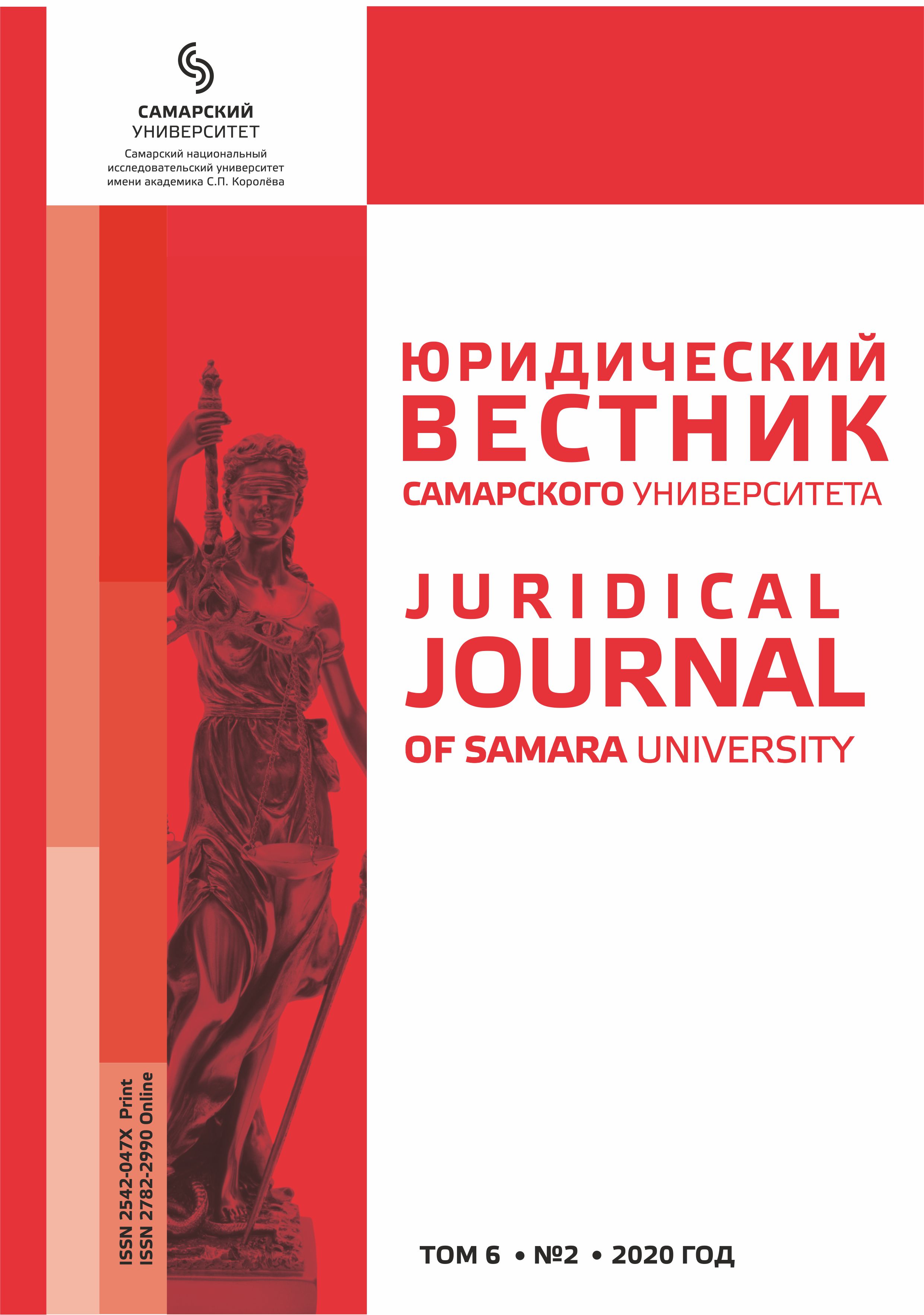NORMATIVE UNDERSTANDING OF THE LAW OF M. I. BAYTIN AS A DIRECTION OF LEGAL POSITIVISM
- Authors: Sukhinin A.J.1
-
Affiliations:
- Department of Theory and History of State and Law, Faculty of Law, Voronezh State University
- Issue: Vol 6, No 2 (2020)
- Pages: 119-123
- Section: Tribune of young scientist
- URL: https://journals.ssau.ru/jjsu/article/view/7935
- DOI: https://doi.org/10.18287/2542-047X-2020-6-2-119-123
- ID: 7935
Cite item
Full Text
Abstract
The article analyzes the narrow-normative approach to the law of M. I. Baytin as a direction of legal positivism. The paper considers different views on the right of supporters of the «broad» and «narrow» approaches. The author considers the narrow-normative approach to the law as a paradigm that has its own content. The article argues that the modern normative approach to the law has played a historically positive role in solving a number of doctrinal and practical problems. The article shows the value and ontological foundations of normativism in the domestic theory of state and law. The author presents for discussion the issues that will contribute to the understanding of the essence of modern law and its methodology. The methodological perspectives of the system approach within the framework of the normative understanding of the law are pointed out. The article draws attention to the characteristics of the conceptual and categorical apparatus within the framework of the normative understanding of the law of M. I. Baytin. The conducted research allows to draw a conclusion about a number of distinctive features of the narrow-normative approach as a kind of legal positivism.
About the authors
A. Ju. Sukhinin
Department of Theory and History of State and Law, Faculty of Law, Voronezh State University
Author for correspondence.
Email: grigorjewa.katerina@yandex.ru
Russian Federation
References
- Vyshinskiy A. Ya. Osnovnye zadachi nauki sovetskogo sotsialisticheskogo prava [Main tasks of science of Soviet socialist law]. Sovetskoe gosudarstvo i pravo [Soviet State and Law], 1938, no. 4, pp. 4–55 [in Russian].
- Baytin M. I. Sushchnost' prava (Sovremennoe normativnoe pravoponimanie na grani dvukh vekov) [The essence of the law (Modern normative understanding of the law on the verge of two centuries)]. Saratov: Izdvo SGAP, 2001, 416 p. Available at: https://otherreferats.allbest.ru/law/00411147_0.html [in Russian].
- Petrov D. E. Differentsiatsiya i integratsiya strukturnykh obrazovaniy sistemy rossiyskogo prava. Pod obshch. red. I. N. Senyakina [Differentiation and integration of structural entities of the system of Russian law. I. N. Senyakin (Ed.)]. Saratov: Izd-vo SGYuA, 2015, 472 p. [in Russian].
- Kuhn T. S. Struktura nauchnykh revolyutsiy. Per. s angl. [The Structure of Scientifc Revolutions]. Moscow: Izd-vo AST, 2003, 605 p. Available at: http://www.biometrica.tomsk.ru/Kuhn.pdf. [in Russian].
- Varlamova N. V. Rossiyskaya teoriya prava v poiskakh paradigmy [Russian legal theory in search for a paradigm]. Zhurnal rossiyskogo prava [Journal of Russian Law], 2009, no. 12, pp. 68–84. Available at: https://elibrary.ru/item.asp?id=12977728& [in Russian].
- Maltsev G. V. Sotsial'nye osnovaniya prava [Social foundations of law]. Moscow, 2011, 800 p. Available at:https://may.alleng.org/d/jur/jur886.htm [in Russian].
- Althusser L. Za Marksa [For Marx]. Moscow, 2006, 392 p. Available at: https://platona.net/load/knigi_po_filosofii/frankfurtskaja_shkola/altjusser_l_za_marksa/57-1-0-2328 [in Russian].
- Denisenko V. V., Sukhinin A. Yu. Sovetskiy normativizm kak teoretiko-pravovaya paradigma [The Soviet normativism as a paradigm of legal theory]. Vestnik RUDN. Seriya Yuridicheskie nauki [RUDN Journal of Law], 2017, no. 3, pp. 380–395. DOI: http://doi.org/10.22363/2313-2337-2017-21-3-380-395 [in Russian].
- Denisenko V. V. Paradigma v prave kak klyuchevaya problema postsovetskoy teorii i filosofii prava [Paradigm in law as key problem post-Soviet theory and philosophy of law]. In: Problemy postsovetskoy teorii i filosofii prava: sbornik statey [Problems of Post-Soviet Theory and Philosophy of Law: collection of Articles]. Moscow: Izdatel'stvo «Yurlitinform», 2016, pp. 127–145. Available at: https://elibrary.ru/item.asp?id=27249069 [in Russian].
- Chestnov I. L. Aktual'nye problemy teorii gosudarstva i prava. Epistemologiya gosudarstva i prava [Actual problems of the theory of state and law. Epistemology of state and law]. Saint Petersburg: SPbIVESEP, 2004, 64 p. Available at: https://b-ok.cc/book/3149483/f64a08 [in Russian].
- Syrykh V. M. Logicheskie osnovaniya obshchey teorii prava v 2 t. T. 1: Elementnyy sostav. 2-e izd. [Logical foundations of the general theory of law in 2 vols. Vol. 1: Elemental composition. 2nd edition]. Moscow: Yuridicheskiy dom «Yustitsinform», 2001, 528 p. Available at: http://nauka.x-pdf.ru/17yuridicheskie/301311-1-vm-sirih-logicheskie-osnovaniya-obschey-teorii-prava-dvuh-tomah-moskva-yuridicheskiy-dom-yusticinform-institut-zakonoda.php [in Russian].
- Bulygin E. V. Izbrannye raboty po teorii i filosofii prava [Selected Works on Theory and Philosophy of Law]. Saint Petersburg, 2017, 476 p. Available at: https://pravo.news/prava-gosudarstva-teoriya/izbrannyie-rabotyi-teorii-filosofii-prava-per.html [in Russian].
- Andreev I. D. Metodologicheskie osnovy poznaniya sotsial'nykh yavleniy [Methodological foundations of cognition of social phenomena]. Moscow: Vysshaya shkola, 1977, 328 p. [in Russian].
- Antonovskiy A. Yu. Kommunikativnaya filosofiya znaniya: ot teorii kommunikativnykh media k sotsial'noy filosofii nauki [Communicative philosophy of knowledge: from the theory of communicative media to the social philosophy of science]. Moscow: Institut filosofii RAN, 2015, 168 p. [in Russian].
Supplementary files










